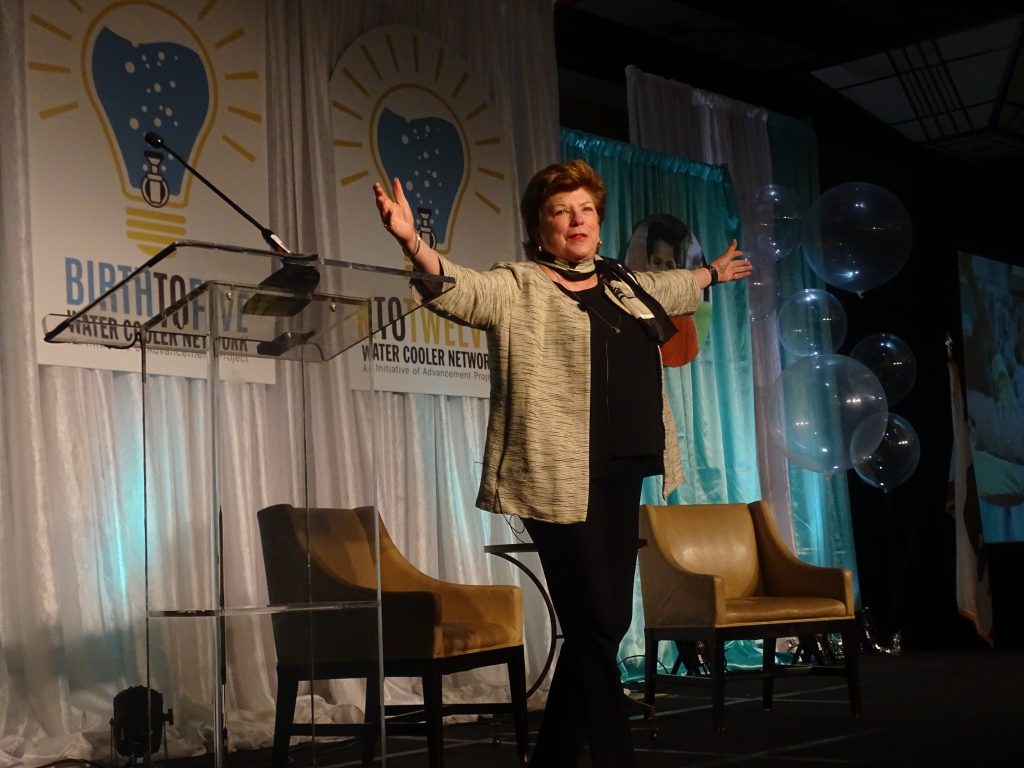
Former State Superintendent of Public Instruction Delaine Eastin.
Credit: John Joanino/Advancement Project California
Despite the office’s imposing title, California’s superintendent of public instruction has little actual power to do much about education.
The governor has far more influence, as does the State Board of Education. And then there are the local school boards, which, by law, are responsible for the nearly 1,000 school districts in the state.
That is why it was remarkable that at least 500 people packed into the Westminster Presbyterian Church in Sacramento last week to honor Delaine Eastin, who was superintendent of public instruction over two decades ago. She was the first, and so far, only, woman to occupy the post.
The state superintendent position is largely what you make of it — and Eastin, who died last November at the age of 76, made the most of it.
Part of her success had to do with her outsize personality. She regularly girded colleagues for any number of political battles with Shakespeare’s rallying cry, “Once more unto the breach, dear friends, once more.”
Part of her impact was rooted in her sustained belief in public education, of which she herself was a product. A native of California, she attended public schools and earned undergraduate and graduate degrees from the University of California.
“Children are the living messengers we are sending to a time we will never see,” she would say. To those who argued that public education costs the state too much, she would offer the rejoinder, “If you think education is expensive, try ignorance.”
And to those who wondered why they should support children in districts other than their own with their taxes, she argued, “This country runs on other people’s children.”
Some of her success had something to do with her oratory, which was honed in her high school drama classes. As an assemblymember before becoming state superintendent, she was regarded as one of the best speakers in the Legislature. She regularly got standing ovations in the multiple speeches she made around the state. Former Assembly Speaker Willie Brown, a legendary speaker himself who attended the memorial service, would often send her to speak in his place.
Her legacy includes her single-mindedness in promoting smaller class sizes in California’s K-3 grades. She was a force in creating California’s Academic Performance Index in 1999, the first statewide system for ranking schools based mostly on test scores.
She was also a leader in promoting California’s first efforts for universal preschool — a vision that is now coming to fruition with the expansion of transitional kindergarten to all 4-year-olds.
Less well known was her backing of Alice Water’s Edible Garden Project, which began at the Martin Luther King Jr. Middle School in Berkeley in the mid 1990s. “If it had not been for Delaine, we would not have had an Edible Garden Project,” said Waters, the founder of the renowned Chez Panisse restaurant just blocks from the school. On a video, Waters shared that there are now 6,500 edible school gardens around the world.
Above all, Eastin was a huge backer of California itself. Californians, she would often say, “are people who grew up somewhere else and came to their senses.”
Throughout her life, she was single-minded in promoting women for public office.
Eastin’s last appearance on the political stage was in 2018 when she “had the audacity to run for governor,” as Lt. Gov. Eleni Kounalakis described the run. It was a quixotic effort at best — something Eastin was well-aware of, Kounalakis said. “She ran largely to talk about the importance of public education.”
As the two of them traveled together around the state during the campaign, Eastin would say, “This is what the future could look like” if they both were elected. But Eastin only got 4% of the vote. Kounalakis was more successful, becoming California’s first woman lieutenant governor.
While she did not make it to the governorship, there was something biblical in the arc of the life of a woman who did not have her own children, despite wanting them — but was nonetheless able to improve the lives of millions of them in her home state.
Her staff in the Department of Education recalled the many times they would set out early, half awake, on yet another trip to an outlying district.
“It’s going to be a great day,” Eastin, ever the motivator, would tell them. “We get to visit schools.”
•••
Louis Freedberg is interim CEO of EdSource.
The opinions expressed in this commentary represent those of the author. EdSource welcomes commentaries representing diverse points of view. If you would like to submit a commentary, please review our guidelines and contact us.

